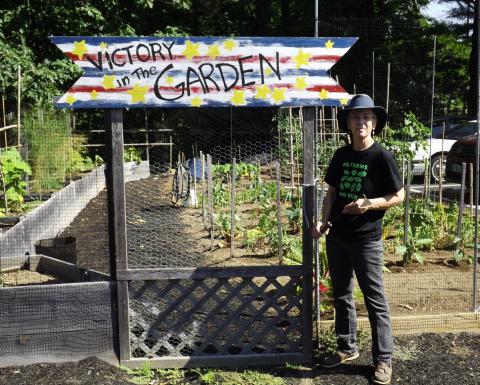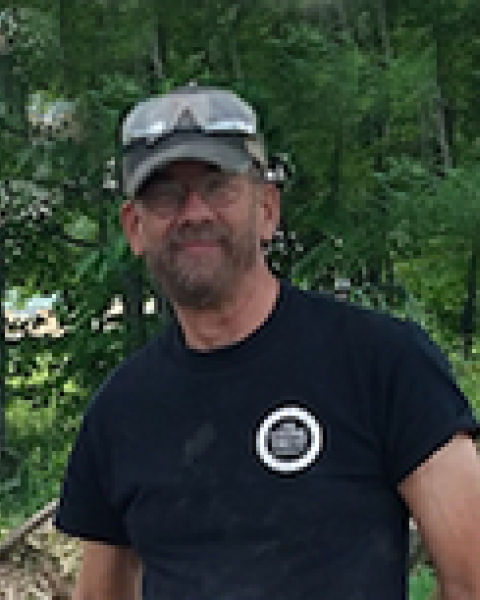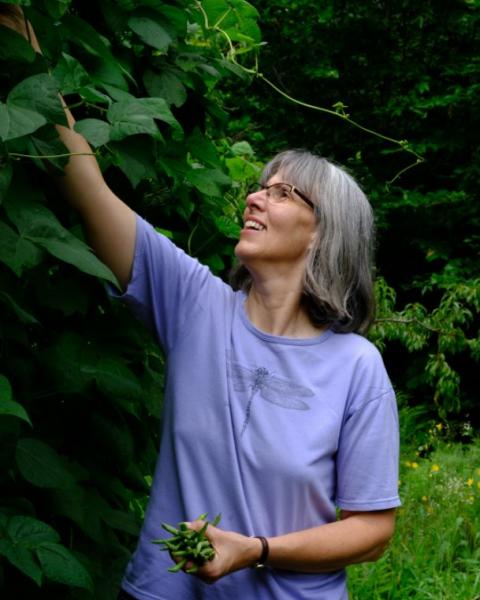Christin Kaiser: Exploring the Web of Life

“I can’t think of anything in the world I’d rather be doing than digging in the soil or exploring the web of life that is under my feet,” Christin Kaiser says from her home in Center Wolfeboro.
A Master Gardener since 2012, Christin says she can’t remember a time when gardening wasn’t part of her life.
Growing up in Boxford, Massachusetts, she recalls her mother’s “handsome rock garden on the sunny south bank of the family home,” as well as the large family garden and the World War II Victory Garden — which has returned as a theme for her gardening.
Six years ago she approached Mike Culver, the new director of the Wright Museum of WWII in Wolfeboro, about doing a demonstration exhibit Victory Garden. After starting with a two-foot raised bed garden, designed to accommodate veterans and others with mobility challenges, she modified it to be a more traditional ground-level garden with perennial fruits and asparagus. The garden includes several interpretive signs that tell about the significance of Victory Gardens as part of the war effort on the home front. For instance, one sign states that in 1945, 20 million Victory Gardens produced approximately 8 million tons of food. During the war years at least 40% of fresh produce grown in American came from personal Victory Gardens like the one Christin tends at the museum.
Christin’s past activities have included service as horticultural chair of a garden club, specializing in period-correct herb gardens. She has won ribbons for an educational exhibit on how to dye wool with plant materials. She also designed and built a butterfly garden at Tuftonboro Elementary School as part of her Master Gardener intern project.
But she wanted to learn more about Permanent Agriculture — permaculture — a worldwide movement to improve agricultural practices and enhance soils. In 2015 she traveled to Australia to attend a two-week residential permaculture course with David Holmgren, cofounder of the permaculture movement.
“With that under my belt I earned my Advanced Master Gardener status,” she says.
This spring Christin attended the premiere three-day intensive aquaponics course at the UNH experimental greenhouses. She intends to incorporate aquaponics into her repertoire of growing techniques next year.
At home her goal is to transform her six-acre parcel into a working permaculture farm, with fruit and nut trees, vines, pastures and other diverse species “to create a reserve of bio-diversity that will show best practices for the surrounding watershed,” she explains.
It’s an ambitious project.
“I expect to be producing tangible results, including educational videos and written records of the progress within the next three to five years,” Christin says.
Christin, like many Master Gardeners, is inspired to keep learning and then share what she has learned in a wide variety of ways.
UNH Cooperative Extension Master Gardener volunteers share information about home, yard, and garden topics with the people of New Hampshire. Got questions? Master Gardeners provide practical help finding answers to your questions through the Ask UNH Extension Infoline. Call toll free at 1-877-398-4769, Monday to Friday, 9 a.m. to 2 p.m., or e-mail us at answers@unh.edu.

